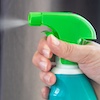Toxicology and Health Effects of Antimicrobials
1.800.858.7378npic@oregonstate.edu
We're open from 8:00AM to 12:00PM Pacific Time, Mon-Fri
A to Z

Toxicology and Health Effects of Antimicrobials
If someone has been exposed to an antimicrobial, review the First Aid Statement on the product label. If it is a medical emergency, call the Poison Control Center at 800-222-1222 for emergency treatment information. If you have questions or concerns about antimicrobial products, call NPIC for information at 800-858-7378.
Do you use or handle disinfectants at work? Watch our video for tips on how to avoid exposures and keep minimize your risk.
Learn more about:
Additional Resources:
- Consumer Product Information Database - DeLima Associates
- Registration Review Schedules: Antimicrobials - Environmental Protection Agency (EPA)
- Hazardous Substances Data Bank - National Library of Medicine
- Antibacterial Household Products: Cause for Concern - Centers for Disease Control and Prevention (CDC)
- National Pesticide Information Retrieval System (NPIRS) - Purdue University
- Toxic Substances Portal - Agency for Toxic Substances and Disease Registry (ATSDR)
- Occupational Safety and Health Topics: Chemicals - National Institute for Occupational Safety and Health (NIOSH)
- RMPP: Disinfectants - Environmental Protection Agency (EPA)
- Glutaraldehyde: Occupational Hazards in Hospitals - Centers for Disease Control and Prevention (CDC)
- Chlorine - National Institute for Occupational Safety and Health (NIOSH)
- Chlorine Fact Sheet - Wisconsin Department of Health Services
If you have questions about this, or any pesticide-related topic, please call NPIC at 800-858-7378 (8:00am - 12:00pm PST), or email us at npic@oregonstate.edu.






